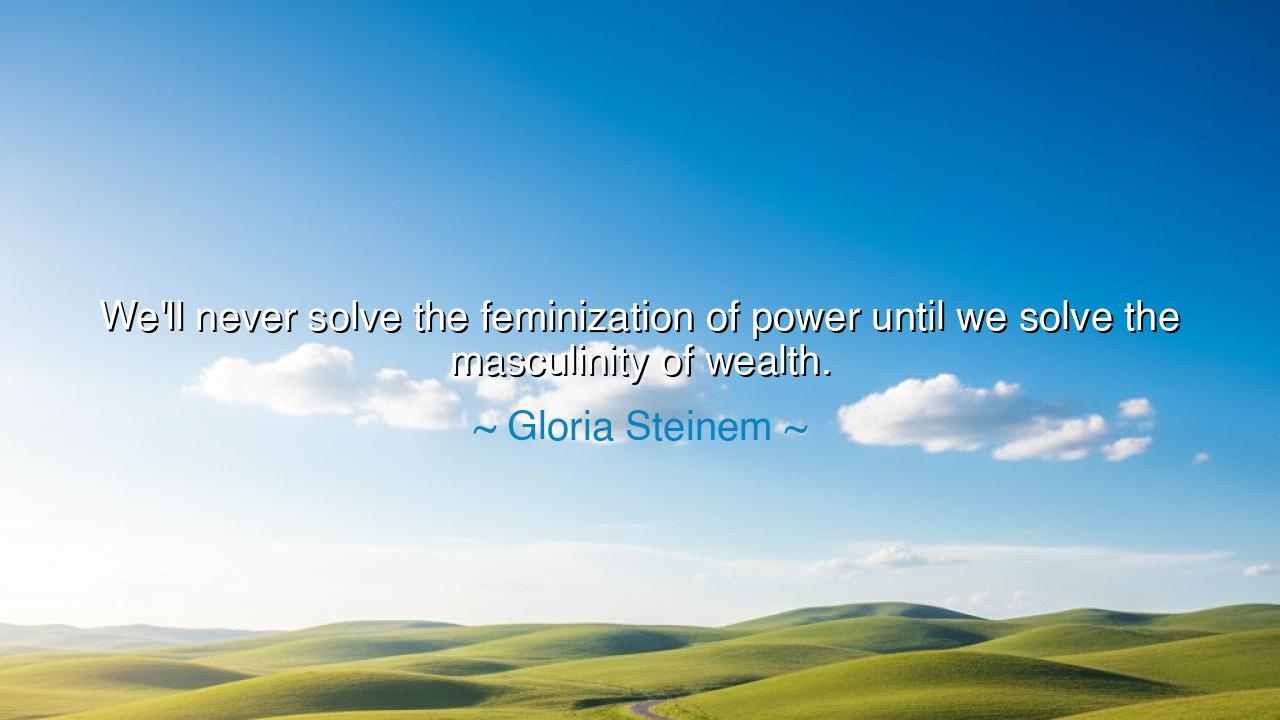
We'll never solve the feminization of power until we solve the






In the words of Gloria Steinem—“We’ll never solve the feminization of power until we solve the masculinity of wealth.”—there resounds a challenge to the very order of society. She reveals the imbalance of a world where power, when wielded by women, is diminished or mocked, while wealth, bound tightly to men, is exalted as strength. Until these twin distortions are corrected, equality remains a mirage. Her words call for a breaking of chains—chains forged not of iron, but of ideas handed down through centuries.
The ancients themselves knew this tension. In Athens, wisdom sat on the lips of women like Diotima, yet their voices were silenced in public life. Wealth and property belonged to men, while women were relegated to the home. Power, when women dared to touch it, was branded as dangerous or unnatural. Steinem unmasks this ancient pattern still alive in modern times: that power in women is treated as weakness, and wealth in men is mistaken for virtue.
There is also here a deeper wisdom: that power and wealth cannot be separated. Whoever controls wealth commands the laws, shapes the culture, and defines what power looks like. Thus, as long as wealth remains gendered—hoarded in the hands of men—then power in women will always be seen through distorted eyes, lessened, feminized, or stripped of its rightful dignity. To heal one imbalance, the other must be healed first.
History offers its witnesses. Cleopatra, queen of Egypt, held political brilliance and charisma, yet her power was framed by Roman historians not as wisdom, but as seduction. Why? Because wealth and the means to define history lay in the hands of men, and so her authority was rewritten to belittle her. In contrast, men who wielded wealth—Caesar, Antony, Augustus—were praised as mighty. Thus we see how the masculinity of wealth distorts the perception of women’s power across ages.
Thus, let this lesson endure: equality is not achieved by permitting women into halls of power still defined by men’s wealth. It comes only when we reshape both—when wealth itself is freed from its masculine cage, and power in women is honored as equal, untainted by stereotype. Steinem’s words remind us that liberation is a double task: to unshackle women from diminished power, and to unshackle humanity from the belief that wealth and strength belong only to men.






TTtu thuong
Steinem's statement challenges the conventional view that women’s advancement in power is merely a matter of opportunity or merit. Instead, she connects it to a deeper, systemic issue about how wealth is structured around masculinity. This raises the question: How can we begin to dismantle the gendered association between wealth and power? How can we foster economic systems that allow both men and women to share power equally, without reinforcing traditional gender norms?
QKhuynh quang khanh
Gloria Steinem’s insight about the feminization of power and masculinity of wealth is powerful, but it raises a complex question: How do we disentangle these two deeply rooted issues? Is it enough to just focus on shifting power dynamics, or do we need to look at wealth distribution as a core part of the conversation? Could altering how we view and distribute wealth be the key to achieving true gender equality in positions of power?
HNHoang Nguyen
This quote by Steinem feels particularly relevant in today's world where the conversation around gender and power continues to evolve. The idea that the feminization of power won’t be solved without addressing the masculinity of wealth makes me question how deeply ingrained these connections between gender and economic systems really are. How much of this dynamic is shaped by history, and how much can we change through new policies and cultural shifts?
HDdang van hua dang
Steinem's quote made me reflect on how wealth and power are so intricately connected to traditional gender roles. If masculinity is tied to wealth, does this mean that the underrepresentation of women in leadership and financial sectors is not just about gender but also about broader societal constructs? How do we reshape these constructs to foster a more equal distribution of wealth and power across genders? Can this change be truly transformative for both women and men?
MTNguyen Minh Ty
Gloria Steinem’s statement presents an interesting critique of how gender dynamics play out in both power and wealth. It suggests that the inequality in power dynamics is tied to the way wealth has traditionally been associated with masculinity. Is it possible that true gender equality in power cannot be achieved without first addressing the systems that perpetuate masculine dominance in wealth? How can we challenge these systems to create a more balanced and inclusive society?